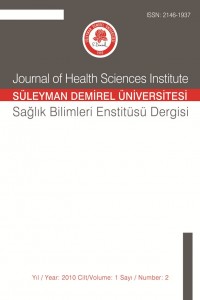Investigation of the influence of phosphatase activity of staphylococcus on the dissolution of a synthetic hydroxyapatite biomaterial
Öz
Objective: Hydroxyapatite (HA) is widely used as bone grafts and as coatings for orthopaedic and dental implants. Staphylococci are accepted as the main pathogens of biomaterial-related infections. The aim of this study was to investigate whether the phosphatase activity of various strains of S. epidermidis had an effect on the dissolution of a synthetic hydroxyapatite biomaterial. Materials and Methods: Ceramic discs were prepared by compressing pure hydroxyapatite powder (Captal R HA, Plasma Biotal, UK) and sintering at 1200ï‚°C. The ability of various strains of staphylococci to produce the phosphatase enzyme was evaluated with two different methods. HA discs were incubated with staphylococcal strains of known phosphatase activity and the calcium concentrations of the medium were measured. HA disc surfaces were examined by means of SEM. Results: No effect of phosphatase activity of different strains of S.epidirmidis on dissolution of Captal HA discs, indicated by release of calcium, was found. Scanning electron microscope (SEM) analysis revealed that the strains of S. epidermidis tested may adhere to HA discs however no visual signs of dissolution appeared on the surfaces.
Key Words: Hydroxyapatite, Staphylococcus, phosphatase, dissolution.
Anahtar Kelimeler
Stafilokokların fosfataz aktivitesinin bir sentetik hidroksiapatit biyomateryalin çözünmesine etkisinin araştırılması
Öz
Amaç: Hidroksiapatit (HA) kemik grefti olarak ve ortopedik ile dental implantlarda yüzey kaplaması şeklinde yaygın olarak kullanılan bir materyaldir. Stafilokoklar biomateryallere bağlı enfeksiyonlarda esas patojen olarak kabul edilirler. Bu çalışmanın amacı S.epidermidis'in farklı suşlarının fosfataz aktivitelerinin, bir sentetik hidroksiapatit biomateryalin çözünmesinde etkisi olup olmadığını bulmaktır. Gereç ve Yöntem: Seramik diskler saf hidroksiapatit tozunun (Captal R HA, Plasma Biotal, UK) preslenmesi ve 1200ï‚°C'de sinterlenmesi ile hazırlandı. Stafilokokların farklı suşlarının fosfataz enzimi üretebilme yetisi iki farklı metotla değerlendirildi. HA diskler fosfataz aktiviteleri bilinen stafilokok suşları ile inkübe edildi ve medyumdaki kalsiyum konsantrasyonları ölçüldü. HA disk yüzeyleri Scanning elektron mikroskobu (SEM) yardımıyla incelendi. Bulgular: S. epidermidis'in farklı suşlarındaki fosfataz aktivitelerinin, kalsiyum salınımı ile belirlenecek şekilde, Captal HA disklerin çözünmesinde bir etkisi olmadığı bulundu. SEM ile yapılan analizler, S. epidermidis'in incelenen suşlarının HA disklere tutunabileceğini gösterdi, ancak yüzeylerde gözle fark edilebilir bir çözünmeye rastlanmadı.
Anahtar Kelimeler: Hidroksiapatit, Stafilokok, fosfataz, çözünme.
Abstract
Objective: Hydroxyapatite (HA) is widely used as bone grafts and as coatings for orthopaedic and dental implants. Staphylococci are accepted as the main pathogens of biomaterial-related infections. The aim of this study was to investigate whether the phosphatase activity of various strains of S. epidermidis had an effect on the dissolution of a synthetic hydroxyapatite biomaterial. Materials and Methods: Ceramic discs were prepared by compressing pure hydroxyapatite powder (Captal R HA, Plasma Biotal, UK) and sintering at 1200ï‚°C. The ability of various strains of staphylococci to produce the phosphatase enzyme was evaluated with two different methods. HA discs were incubated with staphylococcal strains of known phosphatase activity and the calcium concentrations of the medium were measured. HA disc surfaces were examined by means of SEM. Results: No effect of phosphatase activity of different strains of S.epidirmidis on dissolution of Captal HA discs, indicated by release of calcium, was found. Scanning electron microscope (SEM) analysis revealed that the strains of S. epidermidis tested may adhere to HA discs however no visual signs of dissolution appeared on the surfaces.
Key Words: Hydroxyapatite, Staphylococcus, phosphatase, dissolution.
Anahtar Kelimeler
Ayrıntılar
| Birincil Dil | İngilizce |
|---|---|
| Bölüm | Araştırma Makaleleri |
| Yazarlar | |
| Yayımlanma Tarihi | 5 Ocak 2011 |
| Gönderilme Tarihi | 10 Kasım 2010 |
| Yayımlandığı Sayı | Yıl 2010 Cilt: 1 Sayı: 2 |


